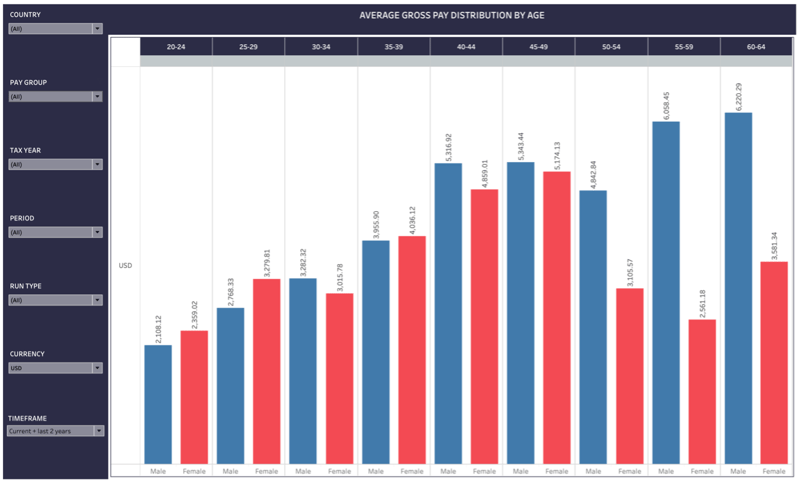“The only constant in life is change,” the ancient Greek philosopher Heraclitus tells us. Even so, it does not always make change either easy to implement or to accept. In the new era of digital technology, change is a regular currency in business as in life. In recent years, the direction of that change has been towards the digital transformation of processes, and payroll processing is not exempt.
How does digital transformation differ from digitization? Digitization converts analog data into digital data, and something businesses have been doing for decades now. Digital transformation is about leveraging digitized data with new and emerging technologies in transformative ways. This means we can now not only collect, process, and store enormous quantities of data (courtesy of the cloud), but, using advanced analytics and data visualization, we can analyze that data in new, innovative ways. And we can access the results anywhere in the world at any time.
What does this mean for payroll processing?
These game-changing technological challenges the the status quo of payroll processing. It enable us to provide far-reaching, convenient, and cost-effective solutions to common payroll challenges, using a customized end-to-end payroll service which organizations can access anywhere at any time, providing vital real-time reporting on the current pay period and previous payroll cycles.
How digital transformation strategy meets the challenges of payroll processing
Eases the problem of local legislation
Organizations operating in multiple countries encounter ever-changing employment and payroll taxes. In addition, languages, customs, political and social realities differ from country to country. Compliance with local requirements is time-consuming and labor-intensive, and understanding and knowing all the specifics for each country is difficult to develop within the business.
However, one of the outcomes of digital transformation is that it is no longer necessary to possess or collate this vast array of knowledge. For example, Immedis uses artificial intelligence technology to power our Country Specific Information (CSI) capability, which provides a detailed payroll database of employee information fields needed for each country’s tax and benefit calculations and compliance requirements.
Within the Immedis Platform, you can see all the required information unique to an individual country and validate all payroll records based on the local needs. This seamless payroll processing experience enables our customers to meet local compliance mandates and navigate salary expectations and tax requirements, as well as day-to-day management of a business in countries with disparate cultural, legal, and social considerations.
Implements standardization across business processes
Executing payroll process in multiple countries is complex work as practices are often not uniform and vary from jurisdiction to jurisdiction. This lack of harmony makes it difficult or time-consuming to calculate and extract valuable data and insights as different countries may employ different methodologies, software, or formats. The lack of a single cohesive practice makes the integration of data almost impossible.
Leveraging digital technologies to automate, integrate, and consolidate all payrolls into a single view, with access to real-time data and analytics functionality, eliminates this challenge. Now companies have at their fingertips the ability to efficiently process, gather data and garner clear insights across all jurisdictions for reporting and data analysis. Average Gross Pay Distribution by Age - just one of the many built-in reports of the Immedis Platform.
Average Gross Pay Distribution by Age - just one of the many built-in reports of the Immedis Platform.
Enables agility and seamless payroll processing
To effectively plan for future growth or identify receding opportunities requires swift analysis of data. Information and reports that merely reflect what has already happened (and sometimes long after the fact) slow down business processes and leave organizations playing catch up. Slower moving multi-country payroll processes that are not integrated and automated can lead organizations to gain insights when it is too late to take steps.
Technology-enabled standardized reporting tools and data analytics ensure that clear, integrated, and swift reporting is now finally possible. Information that is essential for examining past events and, importantly, conducting future workforce modeling and financial planning and analysis (FP&A). Consequently, you can identify outdated processes and build or design new business models.
Improves the employee experience
Employees who must contact centralized payroll departments for every query or concern are another time drain and often a frustrating experience for both parties. Plus, employees today expect access to their payroll information, especially to input their banking details and other personal details.
Digital innovation makes this possible with self-service portals. The Immedis Employee Self-Service enables employees to enter their own information. This means they are not sharing it with anyone. The data is stored securely in the cloud, where it is encrypted, and only authorized users can access it. This is a win-win for both employees and organizations as a whole as it reduces the likelihood of errors and gives payroll teams time back.
Digital transformation initiatives
Netflix are a great example of a company who embraced digital transformation. Their customers used to receive physical DVDs in the mail and were responsible for returning them after use. In this current digital age it's hard to imagine, as the same service is provided, yet with added benefits. This important change was due to digital transformation: as technology developed, standardized operating systems allowed Netflix to deliver on-demand, streaming, low cost, convenient and efficient services.
The equivalent in payroll terms relates to the availability of digital technologies which streamline operations dramatically. So while change can be problematic and need careful management, the results make the digital transformation initiatives worth it.

 Average Gross Pay Distribution by Age - just one of the many built-in reports of the Immedis Platform.
Average Gross Pay Distribution by Age - just one of the many built-in reports of the Immedis Platform.


